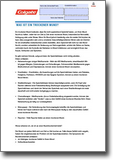Dry mouth
Effects of dry mouth |
A dry mouth is no small thing, because a dry mouth can cause swallowing difficulties, inflammation of the oral mucosa, bleeding gums and tongues, taste disorders and especially common bad breath.
Saliva has an important protective function for the teeth and for the entire oral cavity: it neutralizes the acids that otherwise destroy the tooth substance and strengthens the enamel through its calcium and phosphate content. As a result, the teeth are remineralized. If there is too little saliva in the mouth, more plaque forms. As a result, dental diseases such as caries and gingivitis can develop faster.
If the mouth is permanently dry, a doctor should be consulted. This can measure the salivation rate and then, if necessary, diagnose dry mouth (xerostomia).
How do I know if I have dry mouth?
Permanent saliva deficiency can manifest itself in numerous symptoms:
- Feeling roughness (tongue sticks to the palate)
- increased feeling of thirst
- Difficulty chewing, swallowing and speaking
- Taste disorders
- Halitosis
- Burning mouth and tongue
- dry, chapped lips
- Numbness in the oral cavity
- reduced prosthesis adhesion
How is dry mouth treated?
Since dry mouth can have many different causes, the cause is eliminated during treatment. For example, if you are taking medication, your doctor may dose it differently or use a different product. Likewise, your doctor may prescribe a medication to stimulate and support the salivary gland.
You can also do something about dry mouth. For example, they can often sip water or sugar-free drinks. Also chew sugar-free chewing gum and avoid alcohol and tobacco.
further information about dry mouth
 |
|||||
